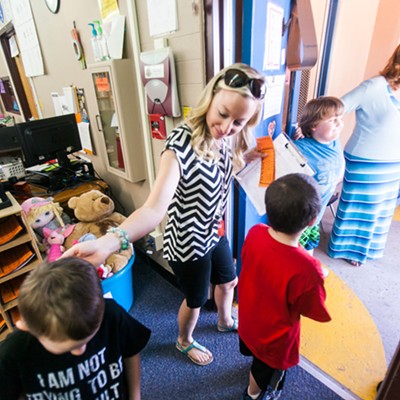Anyway, since we last got together, the school-voucher vultures have backed away from their original positions. They've been trying for years to chip away at the foundations of the public school system, seeing them as bastions of godlessness where kids are taught about sex and history and all kinds of science without first consulting with Jerry Falwell.
For decades, Arizona's public schools were underappreciated, under-supported and under-funded by the powers that were in the State Legislature. But that wasn't enough for the haters.
They kept trying to push through school-voucher plans that would at least partially reimburse the rich folks who sent their kids to private schools. The voucher pimps would all recite the same speech about how their plan would give parents who were unhappy with the local public schools the option of sending their kids to private schools. This, of course, flew in the face of the conservative mantra of self-reliance, but that could be overlooked if it could be used to give teachers' unions a sharp poke in the eye.
With Republicans holding substantial margins in both houses of the Legislature after last year's elections, the vouchers looked like they were going to pass (even though Gov. Janet Napolitano had expressed her distaste with such a plan and was expected to veto any such bill that passed).
The bill actually passed the state Senate this year, with voting almost exclusively along party lines. (Tucson Republicans Toni Hellon and Tim Bee broke ranks, as did Scottsdale's Carolyn Allen, who voted against it because it wasn't draconian enough for her taste.) But the threat of a veto and the fear of costs spiraling out of control prompted them to back off. State legislators have long and painful memories of the alt-fuels debacle that cost the state hundreds of millions of dollars and several of their former homies their jobs.
This year's bill was saddled with the criminally hopeful expectation that there would somehow be a zero-sum outcome, with money simply transferred over from public schools to private schools. However, a legislative budget report showed that for that to happen, private school enrollment would have to more than quadruple in the next decade. Current statewide capacity in private and parochial schools is at 45,000. For the bill to not open a public vein and bleed money, 150,000 students would have to join private-school ranks in the next 13 years. That's simply not going to happen, for a couple really good reasons.
Many private and parochial schools are operating at or near capacity as it is. They neither want, nor have room for, a flood of new students. These schools sell not only high academic standards (and a certain measure of increased campus safety and discipline), but many also market in exclusivity. They sell small class sizes and a clientele made up of like-minded, highly motivated students who push and pull each other along to academic success. It seems unlikely that these schools would want a large number of new students, including those who would qualify for the limited voucher program by not having cut it at the public school.
As I've stated, I personally believe that a kid can get an excellent education anywhere, as long as there is the proper amount of student determination and parental participation. However, some private schools are certainly attractive, and I'm sure they want to stay that way.
So, let's say I'm running a private school that charges $10,000 a year per kid, and we're doing OK. The parents, who work hard and are motivated (and well enough off) to send their kids to private school are happy with class size, and the kids are thriving. Then the state all of sudden says that it'll kick in $4,000 for tuition. Do I, as head of the school, let in a bunch of new students, possibly leading to overcrowding and creating a negative impact on the academic integrity of the institution, or do I simply raise the tuition by the amount of the voucher? Parents who were already sending their kids there wouldn't be out any extra money, and my school's income would increase by 40 percent. Heck, I might even give my original parents a break and only raise it by $3,000, giving them a $1,000 gift on the state's dime. Or, if I want, I could even use the infusion of voucher money to make the school even more exclusive, cutting class size even further through attrition and still making more money.
It's rather odd that I thought of all this and the legislators apparently didn't. And I went to public schools.










